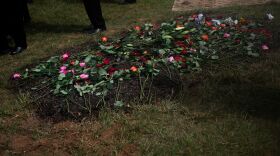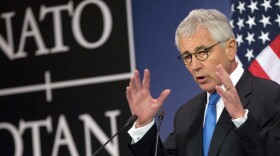
Mary Louise Kelly
Mary Louise Kelly is a co-host of All Things Considered, NPR's award-winning afternoon newsmagazine.
Previously, she spent a decade as national security correspondent for NPR News, and she's kept that focus in her role as anchor. That's meant taking All Things Considered to Russia, North Korea, and beyond (including live coverage from Helsinki, for the infamous Trump-Putin summit). Her past reporting has tracked the CIA and other spy agencies, terrorism, wars, and rising nuclear powers. Kelly's assignments have found her deep in interviews at the Khyber Pass, at mosques in Hamburg, and in grimy Belfast bars.
Kelly first launched NPR's intelligence beat in 2004. After one particularly tough trip to Baghdad — so tough she wrote an essay about it for Newsweek — she decided to try trading the spy beat for spy fiction. Her debut espionage novel, Anonymous Sources, was published by Simon and Schuster in 2013. It's a tale of journalists, spies, and Pakistan's nuclear security. Her second novel, The Bullet, followed in 2015.
Kelly's writing has appeared in the Wall Street Journal, The New York Times, The Washington Post, Politico, Washingtonian, The Atlantic, and other publications. She has lectured at Harvard and Stanford, and taught a course on national security and journalism at Georgetown University. In addition to her NPR work, Kelly serves as a contributing editor at The Atlantic, moderating newsmaker interviews at forums from Aspen to Abu Dhabi.
A Georgia native, Kelly's first job was pounding the streets as a political reporter at the Atlanta Journal-Constitution. In 1996, she made the leap to broadcasting, joining the team that launched BBC/Public Radio International's The World. The following year, Kelly moved to London to work as a producer for CNN and as a senior producer, host, and reporter for the BBC World Service.
Kelly graduated from Harvard University in 1993 with degrees in government, French language, and literature. Two years later, she completed a master's degree in European studies at Cambridge University in England.
-
People being unable to gather or see the bodies of people who died of COVID-19 is having profound psychological effects that will last for years, says psychologist Christy Denckla of Harvard.
-
James Ramos, a Native American who authored three new laws said, "For once, we do have someone in the legislature that understands the issues and the plight of the California Indian people."
-
Dr. Robert Atmar, a member of the CDC's Advisory Committee on Immunization Practices, says he's hearing hesitancy among some front line medical workers about being first in line for a vaccine.
-
A federal moratorium on evictions is set to expire on Dec. 31. Kathryn Leifheit of UCLA says new data suggest evictions are linked to increases in coronavirus cases and deaths.
-
PBS Newshour correspondent John Yang reflects on his experience participating in Moderna's coronavirus vaccine trial. "It started off with self-interest — I wanted to get the vaccine sooner," he says.
-
Midshipman 1st Class Sydney Barber reflects on the historic nature of her selection as leader of the academy's 4,400 students, her plans for the future and what the appointment means to her family.
-
Chuck Hagel, who was also a Republican senator, says President Trump's moves at the Defense Department are compromising national security, too.
-
Ohio Gov. Mike DeWine reflects on his approach to managing coronavirus outbreaks in his state through the winter and what help he needs from the federal government.
-
NPR's Mary Louise Kelly walks listeners through the process of tallying votes and what to expect from All Things Considered on Election Day.
-
The leader of Wilco isn't touring anytime soon, but he's kept creating with help from his sons, who appear with him on a new solo album and in a playful livestream series on Instagram.








